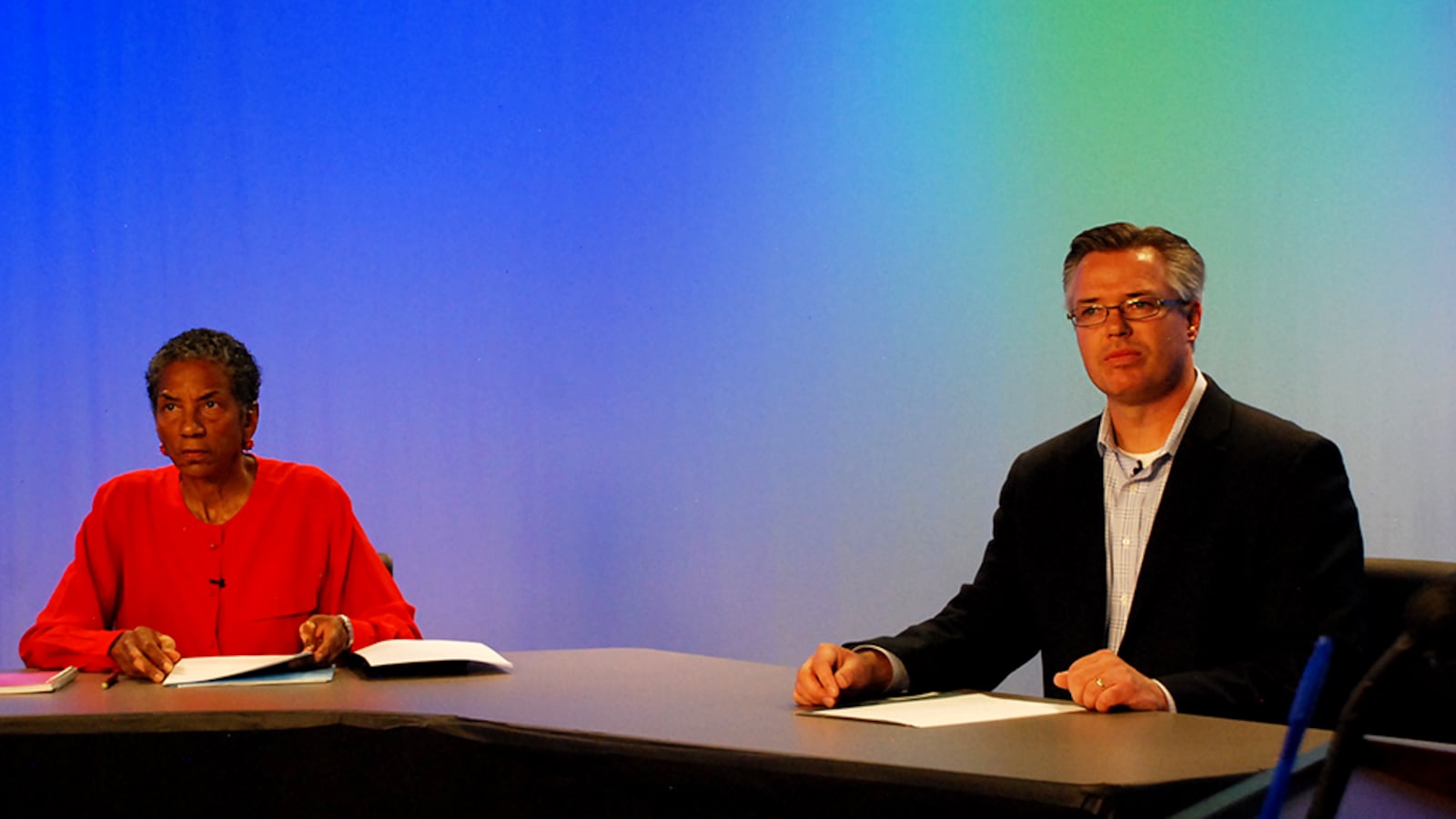Views on the role of charter schools in Denver Public Schools provided the sharpest contrast between incumbent board member Allegra “Happy” Haynes and challenger Robert Speth during a televised debate Monday evening.
Speth, a northwest Denver parent, warned that because of charter growth, “In about 10 years, the entire district is at the risk of privatized,” while Haynes said, “I am for good schools whether they’re charter schools or innovation schools or traditional schools. … My agenda is that every child has an opportunity to get the highest quality education that they can.”
The two faced off in the third of three school board debates co-sponsored by A+ Denver, Denver Decides and Chalkbeat Colorado. The debate was moderated by Chalkbeat Colorado Bureau Chief Eric Gorski and was recorded by DPS’ Channel 22. (Watch the debate in its entirety below).
Haynes, current president of the seven-member board, touted district academic growth, improvement at individual schools and improving graduation and dropout rates as reasons to re-elect her to the citywide seat.
“I believe this is the progress we’ve made under my leadership and that of my colleagues,” she said.
But Speth countered that widening achievement gaps and teacher turnover are signs that the board and the district need to reconsider the direction of DPS. The achievement gap is a “key performance metric that is rapidly moving in the wrong direction. … Over the 10 years my opponent has been involved with the district the gap has been growing and growing.” Haynes was a district administrator before being elected to the board in 2011.
An early question focused on Haynes’ recent appointment as Denver parks and recreation director and the possibility of conflicts of interest between her two roles. The city’s ethics commission on Oct. 21 will consider Haynes’ request for advice on the matter.
“I don’t see a problem at all with serving in both of these roles,” Haynes said. “Both organizations have very clear guidelines on when a conflict arises and what the conduct should be.”
Speth said there’s “an ongoing ethical issue” because “there’s a lot of interaction between these two organizations.” He also referred to “a concentration of power” in the city and district and asked, “At what point is it when we have one person taking on too much?”
Haynes took a bit of offense at that, saying, “My opponent seems to think that elected office and appointive office is a matter of politics and power. I think that’s sad.” She said she thinks she’s in a position of “serving our community in two different ways.”
The two also displayed differences on the issue of closing schools and co-locating different schools in the same building.
Speth said the closing schools “is really near and dear to me as a topic,” referring to controversy in northwest Denver over a middle school closing. He said new charter schools are “there kind of hovering” waiting for buildings, implying that DPS was closing schools to make room for charters. “Closing a school should be the absolute last resort,” he said.
Haynes said, “It’s a tough issue about when you should make a decision to close a school” but that “We owe it to our children if a school is failing to take steps.” Referring to a new school transformation and closure policy being considered by the board, she said there needs to be more consistency and predictability about when schools are closed or overhauled. But Haynes said there’s room for flexibility. “I don’t want to have just a formula.”
On co-location, Speth said the practice is “just unbelievably contentious” and that housing different schools in the same building is not “what the communities of Denver really want.” The board is scheduled to vote this month on locating a middle school in excess space in Abraham Lincoln High School over the objection of many students and parents.
Haynes replied, “What he fails to recognize is these buildings have room in them because of declining enrollment” and that the district has to do what it feels best serves students.
The two subtly needled each other a couple of times about Haynes’ background.
“I’m a parent not a politician,” Speth stressed early in the debate.
“The notion that my opponent is a parent and I’m not is disrespectful,” Haynes said, adding later, “Serving on the school board is not about politics, it’s about doing what’s right for kids.”
Haynes has a long resume in politics, having worked as a city hall staffer and a city council member, plus a stretch on the appointed Colorado Commission on Higher Education. Most recently she worked for CRL Associates, an influential public policy consulting firm.


